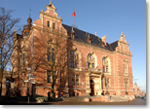Secretariat
Wały Jagiellońskie 1
80-853 Gdańsk Poland
tel. +48 58 301 09 17
tel. +48 58 301 91 23
fax +48 58 301 76 37
 Contact us
Contact us


Political aims of UBC today
Statement by UBC President Mr Per Bødker Andersen at the Baltic Sea Region organisations chairpersons meeting during the BSSSC Conference in Riga October 27th 2001
Mr Chairman, Mr Ambassador, Dear Baltic Sea Friends,
UBC has developed tremendously in terms of size, activities and political perspectives during our 10 years of existence. The former UBC President and present Honorary President Mr. Anders Engström has played a major role in that process. I, as Mayor of the UBC Member City of Kolding, have all the time strongly supported the policy of UBC. This means that the change of Presidency should not be taken as a sign of change of UBC Policy. On the contrary, the UBC will continue to develop in the same direction.
But I would like to take the opportunity to summarise the political position of UBC as it is today, at the shift of the presidency?
What is UBC?
All over the world, the main aim of the political and administrative body in cities in democratic countries is to cater for the wellbeing of its present citizens and for the future generations. This aim is similar for all democratic cities, regardless of size, location, wealth or importance.
The aim takes concrete shape in a wide variety of different activities and responsibilities, close to the daily life of the citizens. Cities are responsible for schools, social services, water supply, waste handling, street management and much more, and is also responsible for spatial, economic and strategic planning of the city for the benefit of future generations.
With this background, it is natural for the political leadership of cities and the city management to meet and share experiences and to act together in order to reach common goals. The aim of UBC can be summarised as:
- to be a meeting place for the political leadership and management in cities in the Baltic Sea Region,
- to carry out projects and activities together, and
- to be an instrument to express the views, problems and political aims of cities.
I would like to outline UBC policy as it is today under some headlines. The first is:
Relation to other BSR organisations
UBC has from the very beginning co-operated with the other Baltic Sea Region networks. We later took the initiative to an intensified co-operation in 1997 when the fourth UBC General Conference gathered in Gdańsk. The theme of the conference was "Networking in the Baltic Sea Region", and a total of 30 different organisations participated. The first meeting of the chairmen of the major Baltic Sea Organisations took place there.
So it is natural for UBC to promote close co-operation between the organisations. I do think that these meetings are very valuable, and I would like to take the opportunity to invite you all for a similar meeting at our next General Conference in Klaipėda 2003 in order to discuss the issues that are burning at that time.
I would like to mention that we paid great attention to the Baltic Sea Co-operation in the Conference resolution from the UBC General Conference in Rostock recently. If we want to archive something, we must act together at all our levels.
Strategic policy areas
There are four strategic policies that should mainstream all UBC activities regardless of sector or activity. Those are:
- The EU enlargement process in the Baltic Sea Region
- Support of implementation of Agenda 21 locally
- Gender Equality
- Promotion of youth involvement in Baltic Sea Region policies and activities
The issues have been discussed in all our Commission, and they have been reported back to the UBC Board. We are presently conducting a Gender Equality analysis in all our activities, and I think the result will be presented soon. We have so far not been so successful in involving youth, but we have not given up.
Strengthening of the local authority level
The local authority level is historically very strong in the Scandinavian countries. There are clear signs that the local authority level in the applicant countries and in Russia is growing in importance. UBC supports this development very strongly, and we try to push on as much as we can. Decentralisation is an inevitable consequence of democracy and market economy. Strengthening of the local authority level thus leads to, or is perhaps a sign of, increased democracy. But a perquisite for a strengthening of the local authorities is institution building in our cities. We call for an increased support for this important process.
Involvement of city level in the EU enlargement process
Cities are very much affected by the EU enlargement, especially in the applicant countries. Every field of city activity will be affected, some only marginally, others very much. Cities will implement many EU policies, in most cases as a consequence of adjustment of national legislation to EU needs, in other cases more directly. In some areas, it will be a very costly affair, for example in the field of environment.
Cities are in spite of this very little engaged in the enlargement process. In order to secure a successful enlargement, cities must be more engaged. UBC is ready to work with these issues. In fact we already are, but problems of funding our EU preparation activities have hampered what we want to do.
The need for small scale project facility
I think there is a wide consensus in this group about the urgent need for multilateral or EU financing of small and medium sized co-operation projects between local and regional authorities. The existing European Union facilities are of course very needed, for example Interreg III, but they mainly finance huge projects. A typical size of an Interreg III B project is 2-5 million Euro. That is a lot of money, especially as it is mainly intended for exchange of experiences and dissemination of know-how. It can be difficult to spend, unless we arrange an endless row of grand conferences or fancy reports on glossed paper, or we spend it on consultants. The very nature of local and regional co-operation projects makes them cheap and consequently cost-efficient, but that is not adhered to.
UBC, BSSSC and CPMR have co-operated in a working group and created a proposal to create such a small and medium sized project facility, to be financed by Interreg III B. As I understand, the response from the European Union and the Interreg III management was rather negative. Perhaps one reason of the lack of a feasible facility is that the local and regional authorities were not involved at all when the Interreg III was created.
I also would like to mention that UBC has supported the Danish initiative to create a CBSS fund for small projects. We did that also in our conference resolution.
Cross-border co-operation
The rules, concepts and regulations on cross-border co-operation were shaped in the European Union in the late sixties and early seventies, when not even Denmark was a member of the European Union. The first activities were for example co-operating fire brigades and swimming-halls, better border crossings, joint development of the local business community, and so on. These activities are excellent but well suited for land borders only.
But we have a serious lack of lands borders but an abundance of maritime borders in the Baltic Sea Region which hampers needed close cross-border co-operation, for example
- between North Denmark and South Norway or West Sweden, or
- Lolland and Mecklenburg-Vorpommern, or
- South Sweden, Bornholm and north-west Poland, or
- South-west Sweden and North-east Poland, Kaliningrad and the Klaipėda region, or
- Gotland and Ventspils, or
- Stockholm region and Estonia, to mention some regions.
The nature of co-operation and perhaps also the level is of course different. Karlskrona and Gdynia cannot have joint fire brigades, but the need for cross-border co-operation is there, which has been proved by close co-operation since many years. In practice, however, it is difficult to get feasible EU support.
In my opinion this is one of the important practical political issues for continued co-operation between our organisations. The aim could be to create new cross-border co-operation concepts better adapted to the needs of our region to be launched in the next EU budget starting from 2006.
Trans-European Network
Also the TEN concepts were developed a long time ago and adapted to inland conditions in the continental Europe. In practice this has lead to that only railways and motorways are included in for example VASAB visions over the future Baltic Sea Region. From transport point of view, Sweden, Finland, Norway and to a great extent Estonia must be considered as islands, as the vast majority of foreign trade and travel passes the sea, with some internal exceptions. All future travels between Russia, the Baltic States and Poland on one hand, and the Scandinavian countries on the other hand, must also pass the sea.
There is a need for highlight of ferry connections across the Baltic Sea, but also an evaluation of the environmental impact of the different modes of transport. Should the trade between Finland or Estonia to Germany go on trucks through Sweden or the Baltic States, or should direct ferry connections be promoted? I have no answer to that question, but it is obvious that sea transport has been neglected in the spatial planning both of the Baltic Sea Region and of Europe as a whole.
Conclusion
With these words I wanted to state the present political aims and priorities of UBC. The Baltic Sea Region will continue to develop, and our policy will of course also continue to develop. My message is that the UBC Political aims have not changed because of the change of the UBC presidency. Mr Anders Engström has made a very god job when formulating the general direction, and I have always fully supported it.
So I look forward to a continuing good co-operation with you for the benefit of the citizens in our region. Thank you.




